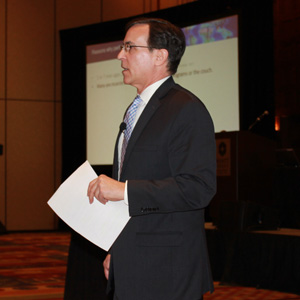Association News: Economics speaker John Manzella breaks down labor, skills, workforce at AAMA Annual Conference
Posted on March 7th, 2019
 Economics speaker John Manzella spoke about the skilled labor shortage crisis in manufacturing and posed possible solutions for how to best address this industry issue. Manzella led an open session on the topic in addition to a closed executive session about international business and trade policy during the American Architectural Manufacturers Association (AAMA) Annual Conference (Feb. 25-28).
Economics speaker John Manzella spoke about the skilled labor shortage crisis in manufacturing and posed possible solutions for how to best address this industry issue. Manzella led an open session on the topic in addition to a closed executive session about international business and trade policy during the American Architectural Manufacturers Association (AAMA) Annual Conference (Feb. 25-28).
Manzella began by noting that the current American unemployment rate is only 4 percent.
"This is fantastic," he said. "But we have a dismal worker participation rate for both men and women. If you can't find labor today, chances are, that problem will only become more severe."
Manufacturing has shifted, Manzella said, leaving rural areas, where it was the previous source for many jobs. These are the same areas being hit hard by the current opioid crisis, to which many workers on disability have fallen victim. Additionally, the rate of Baby Boomers leaving the workforce is still a problem, since those long-time workers are taking their skills with them.
"As a result of all these factors, you've got tremendous vacancies," said Manzella. "Manufacturing jobs that can't be filled are at 428,000. Construction jobs that can't be filled total 382,000."
Manzella estimated that, by 2030, there will be a loss of revenue of 1.75 trillion dollars for companies as a result of the skilled labor shortage.
"If you can't find the labor you need, you can't grow," he said.
Manzella then went into strategies for combatting the crisis.
"In recent years, wages haven't risen, but benefits — non-cash payments like health care plans -- have become more attractive," he said.
Training
He also encouraged employers to focus on job training and consistent skills advancement.
"Invest more in employee education and training," he said. "Train your people with fresh knowledge and keep it fresh."
Skills cycles are now much shorter – things learned today in fields like technology and other areas may only be relevant for a few months rather than years.
"It used to be, your skills would likely still be relevant in 20 years," he said. "Not anymore."
Immigrants
Manzella also spoke about legal immigration and suggested employers make efforts to work with those from outside the United States.
"U.S. schools attract the world's brightest students, but then they send them home to compete with us," he said. "Forty percent of Fortune 500 firms have at least one founder who is an immigrant, or the child of immigrants."
To this end, Manzella recommended employers consider allowing entry for more legal immigrants at all skill levels.
Millennials
Millennials, Manzella said, are also a force to be reckoned with, as they now equate to 40 percent of the current workforce. Retaining them can be a challenge, he said, because their goals and expectations differ from the goals of Baby Boomers.
"Accommodate Millennials with excellent working conditions and incentives with tangible, short-term benefits," said Manzella.
The biggest takeaway, he said, was to remember that knowledge is the only sustainable competitive advantage.
"It's important for your employees to implement new technologies and learn faster than your competitors," he said.
More information about AAMA and its activities can be found via the AAMA website, https://aamanet.org.
AAMA is the source of performance standards, product certification and educational programs for the fenestration industry.SM
###
